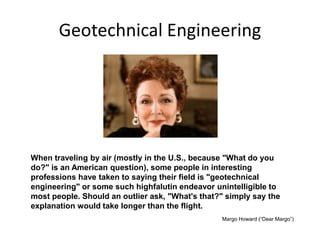The Greatest Guide To Geotheta
The Greatest Guide To Geotheta
Blog Article
Getting My Geotheta To Work
Table of ContentsFascination About GeothetaSome Known Questions About Geotheta.Geotheta Can Be Fun For Everyone3 Easy Facts About Geotheta Described
They team up with civil designers, structural engineers, engineers, and various other professionals to integrate geotechnical factors to consider into the total job layout and building process. This needs reliable synergy, sychronisation, and interaction to guarantee that the geotechnical aspects line up with the project objectives and meet regulative demands.Mining & Materials Engineering: Concepts of drilling, infiltration prices, and elements influencing the choice of exploration method. Blowing up strategies in surface area and below ground workings. Mechanical and continual techniques to fragmentation, consisting of longwall shearing and fullface boring.
Integrated analysis of fragmentation and comminution procedures. Used by: Mining & Materials Engineering.
Some Ideas on Geotheta You Should Know
Bachelor's degree programs in civil, geotechnical, geological, and ecological design usually last four years and consist of basic education programs in English, social scientific research, and the humanities, as well as programs in advanced mathematics, structural geology, and fluid mineralogy. (https://www.behance.net/ianhammond2)
Geotechnical engineering entails the assessment of the dirt and rock problems at a particular site, and their ramifications for the development of that site. As many frameworks depend on the ground for assistance, it is without shock that a thorough understanding of the ground problems, and the suitability of structure systems, are vital to the long-lasting stability and efficiency of the building or structure.
Specialising in the investigation of geological developments and ground practices, geotechnical engineers execute scientific examinations and screening to comprehend the impact these geological formations might carry the layout and construction of structure, civil and facilities projects. This experience is essential for the layout and construction of structures, roads, passages, dams, bridges, and water and sewage systems.
The geotechnical group at Douglas Allies consistently seek advice from architects, style designers, designers, and home builders to make suggestions on layout and development propositions to make sure that the built structures are accordingly designed for the ground problems. As an example, the design of footing systems needs to consider the weight of the framework, the capacity of the ground to support that weight along with activity tolerances and reliable construction.
See This Report about Geotheta
This job is considerably simplified by the use our Douglas Map geospatial system which makes this details conveniently available in a simple to make use of web internet browser user interface. A geotechnical engineer will route the exploration of boreholes and examination pits to collect dirt and other examples, and also analyze surface attributes and ground direct exposures to form a geotechnical design of the subsurface problems.
Depending on the job kind and ground problems experienced, lab screening may to name a few points analyze strength, compressibility, reactivity and/or leaks in the structure of dirt and rock samples. Hereafter information is collected and collated, the results are made use of for a geotechnical design of the site, which is normally offered as areas throughout the site.

A geotechnical investigation by nature can only evaluate the ground conditions at the locations drilled or excavated. Natural variants in soil and rock conditions can happen across a site and between test areas. It is therefore great method that the geotechnical engineer be kept throughout building and construction of the job to offer on-site verification that the ground conditions run into follow the expectations and suggestions provided in the geotechnical examination record.
The Buzz on Geotheta
Geotechnical engineers utilize their thorough knowledge of dirt and rock to assess risk and address problems on diverse infrastructure projectsGeotechnical engineering is a specialist branch of civil engineering which takes a look at the behaviour of planet materials and the application of dirt and rock auto mechanics. Geo Tech Engineering. As a geotechnical engineer, you will certainly assess the physical, mechanical and chemical properties of soil and rock in order to design structures, retaining frameworks and earthworks
Geotechnical engineering is carefully connected to and overlaps with, both engineering geology and ground design - https://penzu.com/p/952dfde2dba9ee4f. It's feasible to be experts in geotechnics or help a geotechnical company but be called a design geologist or a ground designer. As a geotechnical engineer, you'll need to: construct and preserve relationships with customers and other specialists associated with the site, throughout each projectmaintain safety and security requirements on site be conscious of price effects when you make recommendationsstudy geological maps and airborne pictures from a range of sources and from various time periodsexamine building and construction prepares to see just how viable they are based upon your understanding of the siteinvestigate risks or geological dangers for the sitesearch for environmentally delicate features, such as land fill start to create accurate and expository ground modelsplan field investigationsdrill and evaluate examples of bedrock, soil, groundwater and extra products monitor various other professionals on sitesolve technological issues as they develop, such as unexpected structures at drill sitesmonitor problems during and after building to make certain structures are secure in the brief and long termadding data collected on site to your preliminary researchcreating geotechnical calculations, drawings, and 2 or three-dimensional computer system models translating the datamaking referrals about the proposed use the site

Report this page